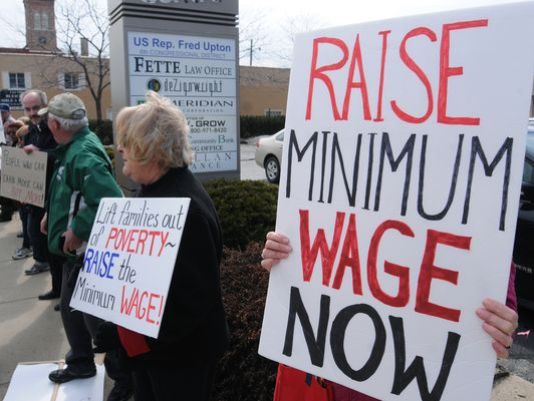
Florida to increase minimum wage Thursday
On New Year’s Day, Florida’s minimum wage will increase by 12 cents to $8.05 per hour, benefiting an estimated 364,000 low-wage workers in the state. The minimum wage for tipped workers in Florida will rise by 12 cents to $5.03 per hour. The increased consumer spending generated by Florida’s minimum wage increase will boost economic growth by $38.7 million, according to an analysis of Census data by the nonpartisan Economic Policy Institute. Florida’s minimum wage increase is the result of a state constitutional amendment approved in 2004 that provides for annual rate adjustments to keep pace with the rising cost of living.
Florida is joined by 19 states — Alaska, Arizona, Arkansas, Colorado, Connecticut, Hawaii, Maryland, Massachusetts, Missouri, Montana, Nebraska, New Jersey, Ohio, Oregon, Rhode Island, South Dakota, Vermont, Washington and West Virginia — that will raise their minimum wage on New Year’s Day, and New York — which will do the same Wednesday — boosting wages for a total of 3.2 million workers.
Minimum wage increases on or before New Year’s Day in the 21 states will generate $838.3 million in total new economic growth as low-paid workers spend their increased earnings on basic necessities such as food, gasoline and housing. The economic boost will increase to at least $1.1 billion later in 2015 once minimum wage increases in Delaware ($8.25 on June 1), Minnesota ($9 on Aug. 1) and Nevada (to be determined) are taken into account.
State legislation approved in 2014 will further increase minimum wage levels in Minnesota to $9.50 by 2016, Michigan to $9.25 by 2018 and the District of Columbia to $11.50 by 2016. In California, a 2013 law will increase the state’s minimum wage to $10 by 2016.
“It’s great that states and localities are acting to lift wages and boost local economies by raising wages for their residents. But the wage crisis is a national crisis, and one that Congress would wisely address by taking a page from the books of states and localities,” said Christine Owens, executive director of the National Employment Law Project. “Throughout the country, voters and local governments have heeded the public’s demand for higher wages. Now it’s time for Congress to do the same, and give workers across the nation the pay raise they need and have earned.”
Under the Fair Minimum Wage Act of 2013, supported by President Obama and introduced in the U.S. Senate and House of Representatives last year, the federal minimum wage would have increased to $10.10 per hour and adjusted annually to account for inflation. It would also have gradually raised the minimum wage for tipped workers from its current low rate of $2.13 per hour, where it has been frozen since 1991, to 70 percent of the full minimum wage. Republicans, however, refused to allow a vote on the bill earlier this year when they blocked its debate in the Senate.
State minimum wage in 2015
Alaska $8.75
Arizona $8.05
Arkansas $7.50
California $9.00
Colorado $8.23
Connecticut $9.15
Delaware $8.25
Florida $8.05
Hawaii $7.75
Illinois $8.25
Maine $7.50
Maryland $8.25
Massachusetts $9.00
Michigan $8.15
Minnesota $9.00
Missouri $7.65
Montana $8.05
Nebraska $8.00
Nevada $8.25[3]
New Jersey $8.38
New Mexico $7.50
New York $9.00[4]
Ohio $8.10
Oregon $9.25
Rhode Island $9.00
South Dakota $8.50
Vermont $9.15
Washington $9.47
West Virginia $8.00
District of Columbia $10.50
(From: 10 News)

